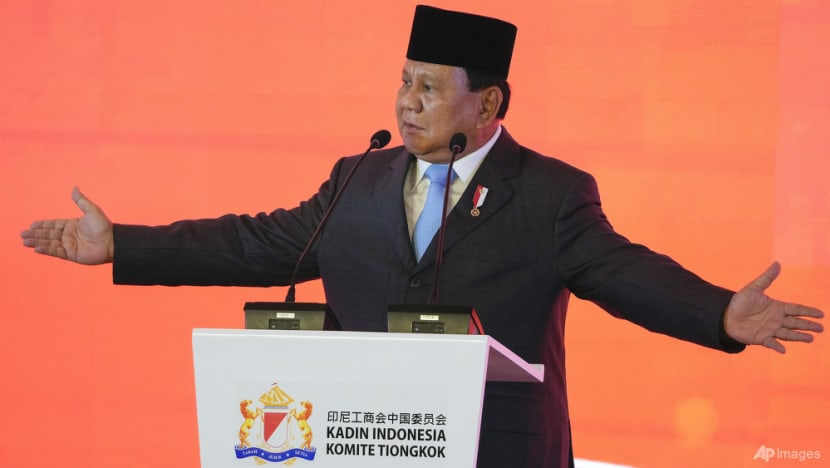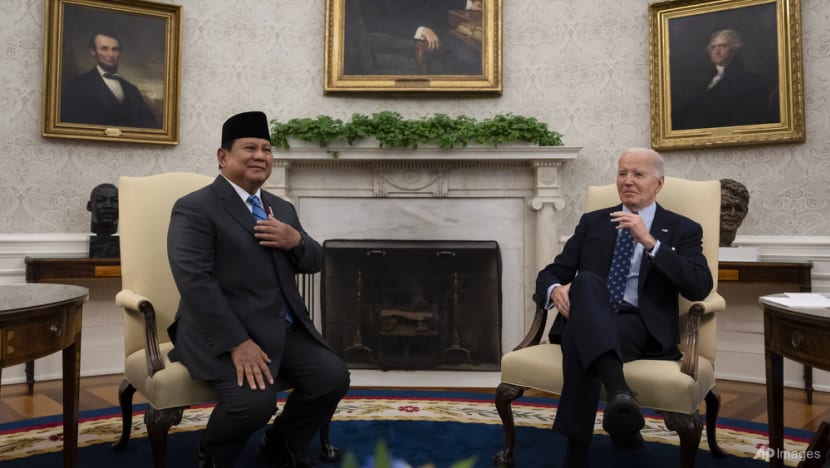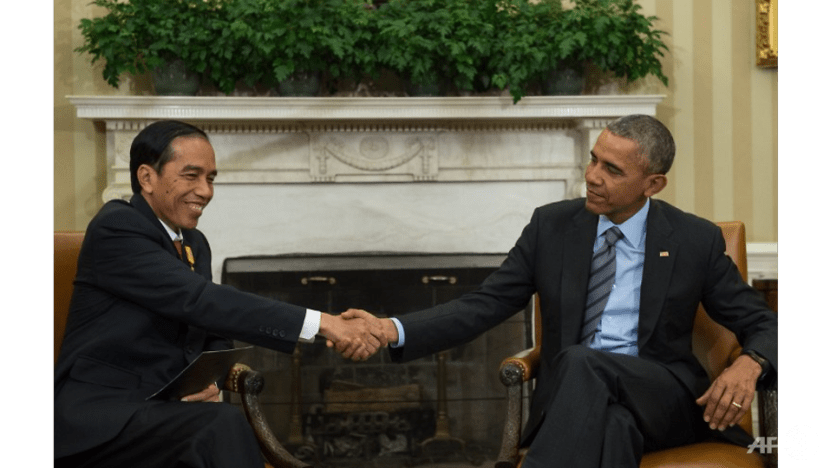analysis Asia
What does Indonesia President Prabowo’s maiden visit to China and US tell us about his approach to diplomacy?
A joint statement by Indonesia and China during President Prabowo Subianto’s first official overseas visit has stirred controversy, while his phone call with President-elect Donald Trump of the US has also elicited many comments.


This audio is generated by an AI tool.
JAKARTA: Less than a month into his presidency, Indonesia’s Prabowo Subianto has made international headlines on his first tour abroad.
Currently at the Asia Pacific Economic Cooperation Summit in Peru, his done-and-dusted visits to China and the United States have generated extensive coverage for both the right and wrong reasons.
His trip has raised Indonesia’s profile on the world stage and stirred pride among Indonesians who watched him engaging with world leaders who value close ties with the world’s third-largest democracy and Southeast Asia’s largest economy.
But he also ignited controversy and concern with a maritime agreement inked with China and a joint statement by both countries, and has had to pledge to defend Indonesia’s sovereignty with regard to China’s claims over much of the South China Sea.
The trips show that even as Mr Prabowo takes a more hands-on foreign policy approach than his predecessor Joko Widodo, he must be more than a one-man show and tap the experience of Indonesia’s diplomatic corps, experts say.
During his 10 years as president, Mr Widodo often entrusted diplomacy issues to his Foreign Minister Retno Marsudi, who was a career diplomat.
PRABOWO’S CHINA VISIT
After winning February’s presidential election, Mr Prabowo’s first trip abroad was to China in March.
Following his inauguration on Oct 20, he made the same decision by visiting Beijing from Nov 8 to 10 and meeting Chinese President Xi Jinping, Premier Li Qiang and number three official Zhao Leji.
Both countries signed a maritime agreement, but it was a line in their joint statement on Nov 9 that caused concern and discussion among foreign policy watchers.
The statement said “the two sides reached an important common understanding on joint development in areas of overlapping claims” and agreed to establish an Inter-Governmental Joint Steering Committee to explore and advance relevant cooperation, pursuant to their respective prevailing laws and regulations.
This contrasted with Indonesia's stance that it is a non-claimant state in the South China Sea and has no overlapping jurisdiction with China.
In the wake of the joint statement, Indonesia’s foreign ministry said its position was unchanged and the agreement would have no impact on its sovereign rights.
"Indonesia reiterates its position that those (Chinese) claims have no international legal basis," it said.
"The partnership does not impact sovereignty, sovereign rights or Indonesia's jurisdiction in the North Natuna Sea."
China claims most parts of the South China Sea using its so-called “nine-dash line”, and has overlapping claims with the Southeast Asian states of Brunei, Malaysia, the Philippines and Vietnam.
Related:
While it is good that Indonesia’s foreign ministry clarified the country’s position, Dr Shafiah Muhibat, a Jakarta-based China expert with the Centre for Strategic and International Studies (CSIS), said it does not change what was written in the joint statement.
“The paragraph should not have been there in the first place,” said Dr Shafiah.
The ministry and Mr Prabowo have not explained how the phrase ended up in the joint statement, but Dr Shafiah suggested it may be an oversight by an official who was supposed to analyse the document before it was signed.
“Or it could be that the person has not missed it, but did not think or understand that the impact would be that big,” she said.
“I think that is the biggest possibility, but we are just outsiders. We don’t know. “
Accompanying Mr Prabowo on his tour are several ministers including Foreign Minister Sugiono, Coordinating Minister for Economic Affairs Airlangga Hartarto, Minister of Maritime Affairs and Fisheries Sakti Wahyu Trenggono, Minister of Investment and Downstreaming Rosan Roeslani and Minister of Energy and Mineral Resources Bahlil Lahadalia.
Asked on Wednesday (Nov 13) about the issue of the South China Sea, Mr Prabowo said that he would "always safeguard our sovereignty", adding that partnerships are better than conflicts and that "we respect all powers".
During Mr Prabowo’s visit, Indonesia and China also signed several agreements worth US$10 billion to finance programmes including the president’s flagship free-meals programme for schoolchildren and pregnant women. Other deals covered sectors including new energy and biotechnology.
PRABOWO’S UNITED STATES VISIT
After China, Mr Prabowo flew to the US at the invitation of US president Joe Biden.
He met behind closed doors with Central Intelligence Agency director William J Burns, had a phone call with US president-elect Donald Trump, attended a dinner with Secretary of State Antony Blinken at the American Foreign Service Association in Washington DC and met his former counterpart, Secretary of Defence Lloyd Austin.
Mr Prabowo met President Biden at the White House on Tuesday evening and headed for the APEC Summit on Wednesday.

The US-Indonesia joint statement commemorated 75 years of diplomatic relations between the world’s second- and third-largest democracies and applauded progress in their partnership. It covered points such as cooperation in food security and renewable energy.
The statement also said: “Both leaders underscored their unwavering support for upholding freedom of navigation and overflight as well as respect for sovereign rights and jurisdiction of coastal states over their exclusive economic zones in accordance with international law of the sea, as reflected in the 1982 United Nations Convention on the Law of the Sea (UNCLOS).”
Analysts picked up on the difference between Indonesia’s joint statements with China, and the US.
"The wording in the US joint statement related to (UNCLOS) is 180 degrees different from the joint statement with China. With the US, it says specifically that the rules are based on … UNCLOS,” noted Dr Shafiah.
"So this is funny. On the one hand, we say this. On the other hand, we say that,” said Dr Shafiah.
She also noted that with Mr Biden due to step down in January, there is no guarantee that his Republican successor Trump will follow what has been agreed upon by both sides.
Mr Prabowo also displayed his own brand of diplomacy when he posted videos of himself speaking with Trump and shared a video on his Youtube channel of the dinner with Mr Blinken.
He asked Mr Blinken after the dinner about Palestine. "What about Palestine? Can you find a solution to this?" asked Mr Prabowo, to which Mr Blinken replied: "We are currently working hard on the problems there.
Indonesia is a vocal supporter of Palestinian independence.
In the call with Trump, Mr Prabowo told him: "Wherever you are, I'm willing to fly to congratulate you personally, sir.”
Trump replied: "We'll do that, anytime you want.”
Trump also praised Mr Prabowo’s English, to which the Indonesian leader explained that all his (military) training was American.
Indonesian President Prabowo Subianto has arrived in the US, starting his trip with a call to congratulate President-elect Donald Trump on his victory in last week's election. Mr Prabowo posted a video of the call on his social media channels. The pair could be heard praising one another on their achievements as leaders. Mr Prabowo will hold his first meeting with his US counterpart Joe Biden later today. Mr Prabowo's trip follows a recent state visit to China. He has emphasised that Indonesia is non-aligned and is respectful of all world powers. Saifulbahri Ismail reports from Jakarta.
The video of the call received mixed reactions on Mr Prabowo’s social media accounts, with some applauding Mr Prabowo for being able to speak to Trump and others saying that he seemed desperate to meet the president-elect.
Mdm Suzie Sudarman, an international relations expert from the University of Indonesia, said the phone call reinforces the view of some Indonesian political watchers that the US has a limited perception of what it wants from Indonesia.
“America cannot conceptualise it. ‘Tell me, I don’t have time. Tell me, 1, 2, 3, what you want.’ That also happened when Jokowi met Obama,” said Mdm Suzie, referring to the previous presidents of both countries.
When Mr Barack Obama was US president, Indonesia hoped it would mean a better relationship between both countries as Mr Obama had spent part of his childhood in the country, but some observers feel it was largely business as usual.

DIPLOMACY NOT A "ONE-MAN SHOW"
While Mr Prabowo’s trips have raised Indonesia’s profile as well as his own on the global stage – his ongoing two-week tour will include the G20 Summit in Brazil and other stops – it is still unclear what Indonesia will manage to gain in the longer term, analysts said.
The implementation of joint statements with both big powers also remains to be seen, they said.
"What might be interesting for us is to wait for whether these joint statements will be implemented as they are according to the wording, or whether there will be changes again according to the clarification that has been made,” said Dr Shafiah, referring to the joint statement with China.
"We have to wait and see how it continues,” she said.
And while Mr Prabowo has signalled he will be more involved in Indonesia’s foreign policy, analysts say he would benefit from tapping the experience of his team more.
Between winning February’s election and his inauguration, Mr Prabowo made about 20 trips abroad in his capacity as defence minister and president-elect.
“Mr Prabowo seems to be a one-man show person when it comes to foreign politics,” observed Associate Professor Dinna Prapto Raharja, executive director of Jakarta-based think tank Synergy Policies, which focuses on political, social and economic sciences.
“It is okay if he wants to appear on the global stage, but he is a very ‘one-man show’ person. Everything depends on what he wants.”
Besides the uproar over the inclusion of “overlapping claims” in the joint statement between Indonesia and China, other details have caught the eye of foreign policy watchers.
For instance, a line in the statement said: “Both sides emphasised that head-of-state diplomacy provides political safeguard and strategic guidance to the furtherance of China-Indonesia relations.
"Both sides will follow the important common understandings between the two heads of state, maintain close high-level exchanges, enhance strategic communication, deepen experience sharing in governance, and continue to enhance strategic and political mutual trust.”
This, Assoc Prof Dinna said, is unusual because foreign policy is not owned by a head of state and should instead represent a country and its people.
“This is strange. There is no document from a head of state, especially after only visiting another country once, that makes a very serious statement and is undoubtedly considered binding by China.
“The key (question) is, what does this mean to Xi Jinping?”
She also noted that the joint statement touched on a different bilateral pattern as it mentions cooperation programmes in detail, such as China’s Belt and Road Initiative.
It goes on to state: “China commends Indonesia’s development priorities put forward by President Prabowo Subianto such as the free nutritious meal initiative, food sovereignty and resilience, energy self-sufficiency, and stands ready to support Indonesia to realise the above-mentioned visions.”
She believes such a take-and-give relationship between countries is not typically included in a joint statement.
TAP KNOWLEDGE OF FOREIGN MINISTRY VETERANS, SAY ANALYSTS
Assoc Prof Dinna questioned the role the foreign ministry will play under Mr Prabowo, especially since Foreign Minister Sugiono, who goes by one name, is a former member of the army’s special forces and deputy chairperson of Mr Prabowo’s Gerindra party with no prior official diplomatic experience.
Mr Prabowo should tap existing mechanisms and institutional knowledge in the foreign ministry, she said.
"In diplomacy, there are very sensitive terms that even need to be avoided," she explained.
"Then there are also certain types of negotiations. The head of state needs to understand this to increase Indonesia's leverage."
The foreign minister and deputies must also be more active and work together to communicate certain things to the president, she added.
In bilateral meetings, for example, with China or the US, Mr Prabowo should leave his ministers to settle the fine print of documents, and recognise that what he eventually reads out need not be as detailed.
“Because something very detailed and written is binding. Even though one may argue that it is not legally binding, when a head of state publishes it, it is settled,” she said.
The key lesson is for the president and his foreign minister to listen and learn from the experienced diplomats in the ministry.
“Diplomacy is complex. A negotiation process for one or two articles can take years. So, it is not child’s play," she said.
Civil society groups can also actively warn the government if something is amiss, she added.
“Don't be discouraged, this is just the beginning. Things can still be improved.”

















